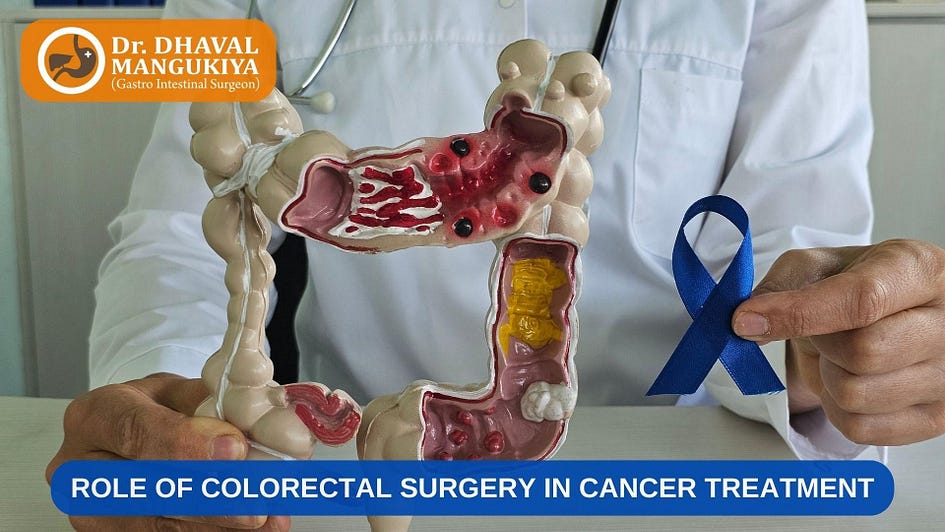The Role of Colorectal Surgery in Cancer Treatment: By The Best Colorectal Surgeon In Surat

Colorectal cancer, when diagnosed early, is highly treatable with surgery playing a central role in the management of the disease. However, the role of colorectal surgery extends beyond the treatment of cancer itself. As one of the best colorectal surgeons in Surat, Dr Dhaval Mangukiya, not only aims to remove tumours but also work to restore normal bowel function, improve quality of life, and address complications arising from both cancer and its treatment. This blog explores the vital role of colorectal surgery in cancer treatment and the broader impacts it can have on patients’ lives.
Colorectal Surgery as a Primary Treatment for Cancer
When doctors diagnose colorectal cancer, surgery often becomes the cornerstone of treatment, particularly for early-stage disease. The primary goal of colorectal surgery in these cases is to remove the tumour and any surrounding tissue that may contain cancer cells. Surgeons aim to achieve “clear margins,” meaning no cancer cells are left at the edges of the removed tissue, reducing the likelihood of recurrence.
There are several types of colorectal surgeries, explains Dr Dhaval Mangukiya, depending on the location and extent of the cancer:
- Colectomy: Surgeons remove part or all of the colon.
- Hemicolectomy: A specific portion of the colon is removed, either on the right or left side.
- Sigmoidectomy: The sigmoid colon, the S-shaped final part of the large intestine, is removed.
- Proctectomy: Surgeons remove part or all of the rectum.
These procedures are often performed using minimally invasive techniques, such as laparoscopic or robotic surgery, which offer benefits like smaller incisions, reduced pain, and quicker recovery times. Regardless of the technique, the best gastrointestinal surgeon in Surat aims to eliminate the cancer and give the patient the best possible chance of cure.
Beyond Tumour Removal: Preserving and Restoring Function
While the removal of cancer is the primary goal, colorectal surgery also focuses on preserving and restoring normal bowel function. This aspect of surgery is critical because the colon and rectum play essential roles in the digestive process, particularly in the absorption of water and nutrients, as well as the elimination of waste.
In some cases, surgery may involve the creation of a stoma, where an opening is made in the abdominal wall to allow waste to bypass the rectum and be collected in a bag outside the body. Surgeons may create a temporary stoma to allow the bowel to heal after surgery, or it may be permanent if the entire rectum is removed.
While the prospect of living with a stoma can be daunting, many patients adjust well with the proper support and education. Surgeons, along with specialised stoma care nurses, provide crucial guidance to help patients manage their stoma and maintain a good quality of life. Additionally, where possible, surgeons may perform restorative procedures such as ileoanal pouch surgery, which can eliminate the need for a permanent stoma by creating a new reservoir for waste inside the body.
Addressing Complications and Recurrent Disease
Colorectal surgery also plays a significant role in managing complications that arise from cancer or its treatment. For instance, scar tissue from previous surgeries or radiation therapy can cause bowel obstructions, where the intestines become blocked and prevent the normal passage of waste. The best gastro surgeons in Surat can perform procedures to relieve these obstructions and restore normal bowel function.
In cases where colorectal cancer recurs, surgery may still offer a chance for treatment. Surgeons can remove recurrent tumours, even if they appear in other parts of the body, such as the liver or lungs, through procedures known as metastasectomies. These surgeries aim to remove cancerous growths that have spread from the original site, offering the possibility of prolonged survival or even cure in some cases.
The Psychological and Social Impact of Colorectal Surgery
Colorectal surgery not only impacts the physical body but also has profound psychological and social effects. The experience of undergoing major surgery, especially one that affects bowel function, can lead to feelings of anxiety, depression, and concerns about body image and intimacy.
Recognising this, the best stomach surgeons in Surat often collaborate with psychologists, counsellors, and support groups to provide comprehensive care that addresses both the physical and emotional needs of their patients. Pre-operative counselling can help patients understand what to expect, while post-operative support can assist in their adjustment to changes in their body and lifestyle.
Support doesn’t end after the surgery. Follow-up care is an integral part of the treatment journey, helping to monitor for recurrence, manage any ongoing symptoms, and provide continued emotional support. The aim is to ensure that patients not only survive their cancer but also thrive in their post-treatment lives.
Conclusion
Colorectal surgery is a vital component in the treatment of colorectal cancer, offering the best chance of cure through tumour removal while also addressing the broader needs of patients. Beyond treating cancer, colorectal surgery helps restore normal bowel function, manage complications, and provide support for the psychological and social challenges that patients may face. As technology and techniques continue to advance, colorectal surgery will likely play an even more significant role in improving outcomes and quality of life for patients with colorectal cancer.
Comments
Post a Comment